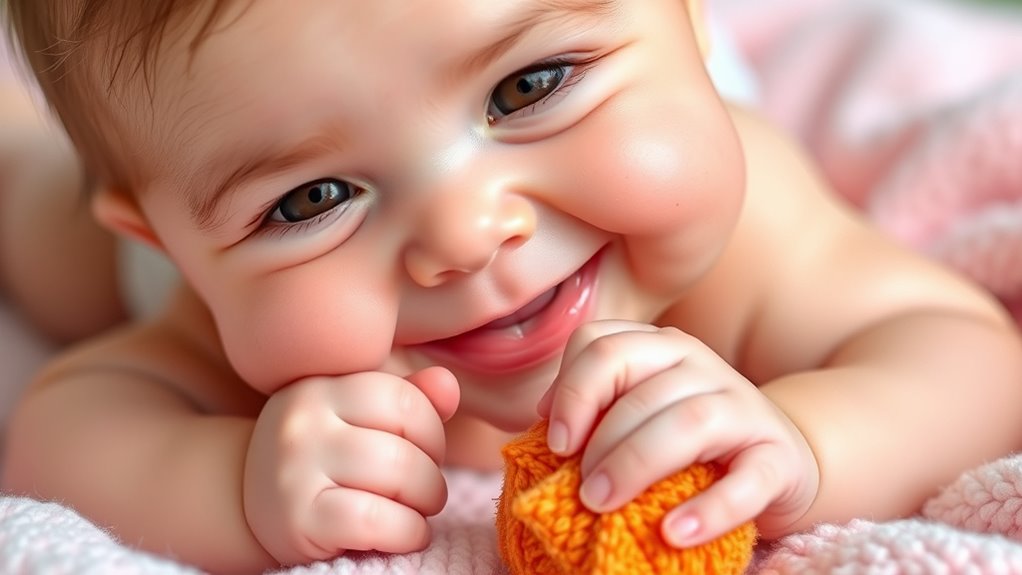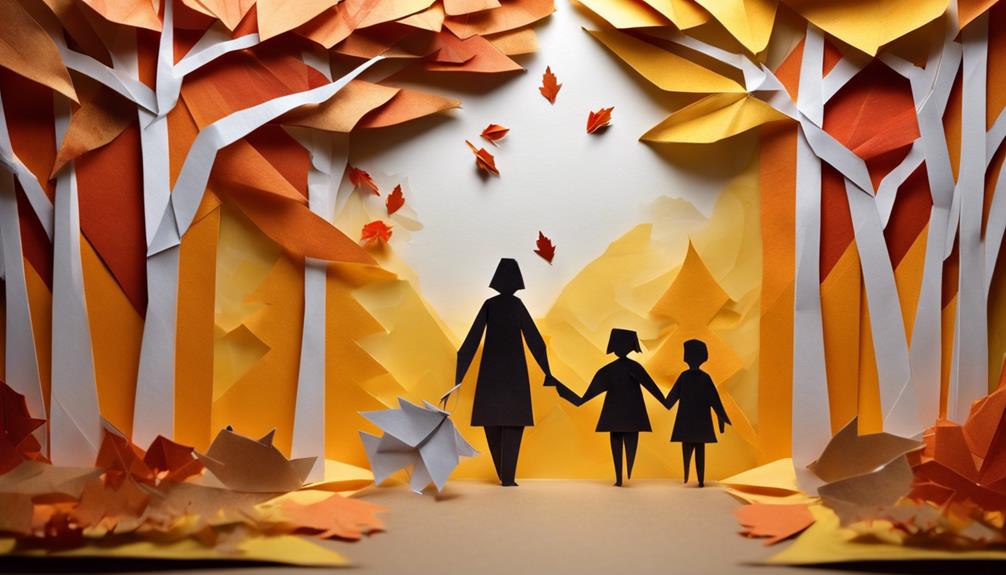At 4–6 months, your baby rapidly develops motor skills like grasping objects and hand-eye coordination. They become more curious, exploring surroundings through touching and mouthing, which boosts their cognitive growth. Your little one also starts to smile, giggle, and imitate facial expressions, strengthening social bonds. Communication skills improve as they babble, recognize voices, and respond to simple words and gestures. Keep exploring these milestones to help support their ongoing development and growth.
Key Takeaways
- Motor skills improve with purposeful grasping, reaching, and transferring objects, indicating growing coordination.
- Cognitive exploration increases through sensorimotor play, recognizing cause-and-effect relationships.
- Social-emotional skills develop via playful interactions, imitation, and emotional recognition.
- Communication advances as babbling emerges and understanding of simple words and gestures improves.
- Overall growth is marked by milestones in motor, cognitive, social, emotional, and language development.

Baby Einstein Outstanding Opus The Octopus Sensory Rattle & Teether Multi-Use Toy, BPA Free & Chillable, 3 Months & up, Multicolored
Multi-sensory teether – Promotes sight, sound, and touch engagement with brightly colored rattle beds, and 8 touchable and…
As an affiliate, we earn on qualifying purchases.
As an affiliate, we earn on qualifying purchases.
Physical Development: Motor Skills and Coordination
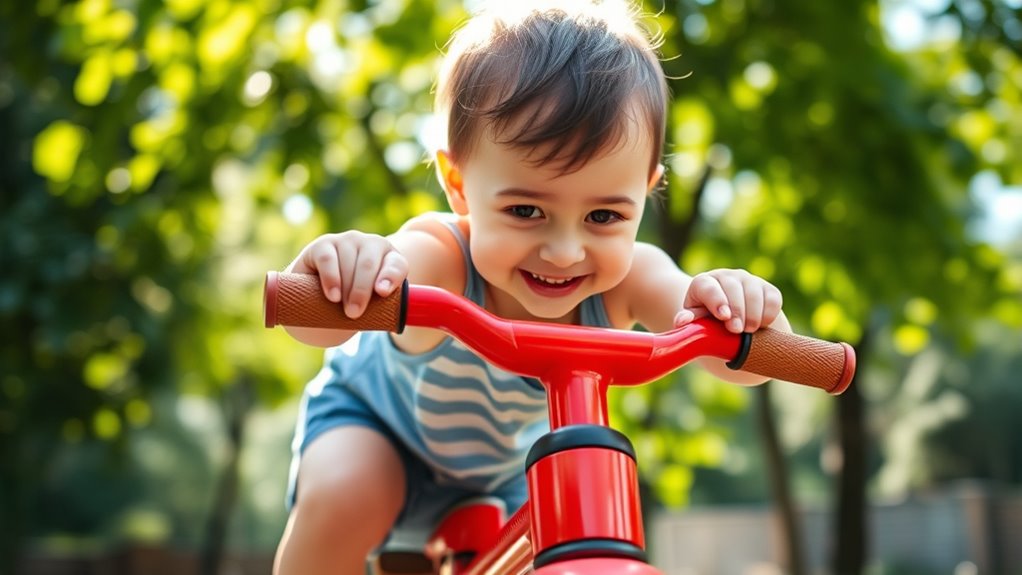
During this age range, your baby is rapidly developing their motor skills and coordination. You’ll notice they start to grasp objects with more purpose, showing improvements in their fine motor skills. Their hand eye coordination is also becoming more refined as they learn to reach for and hold toys, bringing objects to their mouth or transferring them between hands. You might see them batting at dangling toys or trying to pick up small items with their fingers. These achievements indicate their muscles and nervous system are working together effectively. Supporting this development by offering safe, engaging toys encourages your baby to practice these skills. Additionally, providing opportunities for muscle development through gentle activities can further enhance their coordination. Engaging in sensory play can also stimulate their overall growth and exploration. Understanding the importance of early childhood development can help you better support these milestones. Keep in mind that every baby develops at their own pace, but these milestones are signs of healthy growth during this exciting stage.

Smart Steps® Happy Hammer Grasping and Reaching Toy
PERFECT FOR CHILDREN 9 MONTHS AND UP: The Happy Hammer designed by Smart Steps is perfect for children…
As an affiliate, we earn on qualifying purchases.
As an affiliate, we earn on qualifying purchases.
Cognitive Growth: Exploring and Problem-Solving
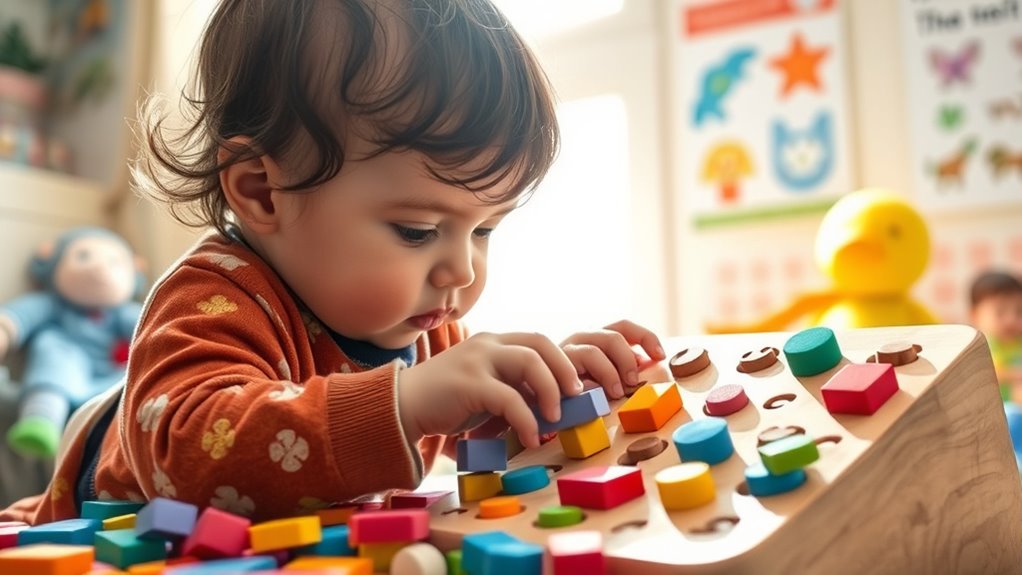
Have you noticed your baby becoming more curious about their surroundings? This curiosity fuels their cognitive growth through sensorimotor play, where they explore objects by touching, shaking, or mouthing them. During this stage, your little one begins to understand cause-and-effect relationships, developing problem-solving skills as they figure out how things work. Their memory development also advances, allowing them to recognize familiar faces and objects, even from a short distance. You might see your baby searching for a toy they dropped or reaching for something they saw earlier. These behaviors show they’re actively exploring and learning. Providing safe, varied objects encourages this exploration, helping your baby build a stronger foundation for understanding their environment and strengthening their cognitive abilities. Additionally, engaging with visual stimuli such as colorful patterns or moving images can further support their developing perception skills. Creating a stimulating environment with diverse sensory experiences can also boost their overall cognitive development.
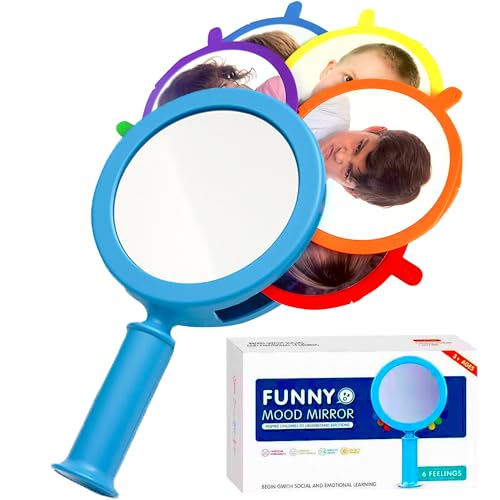
Emotion kids Mirror – Social Emotional Learning Activities & Autism Toys for Toddlers – Sensory Toys for Kids with Autism – Autism Sensory Products for Calm Down Corner – Therapy Games for Kids
Toddler Mirror for emotions. This unbreakable mirror for kids is perfect emotions toys for teaching toddlers catching feelings….
As an affiliate, we earn on qualifying purchases.
As an affiliate, we earn on qualifying purchases.
Social and Emotional Expressions
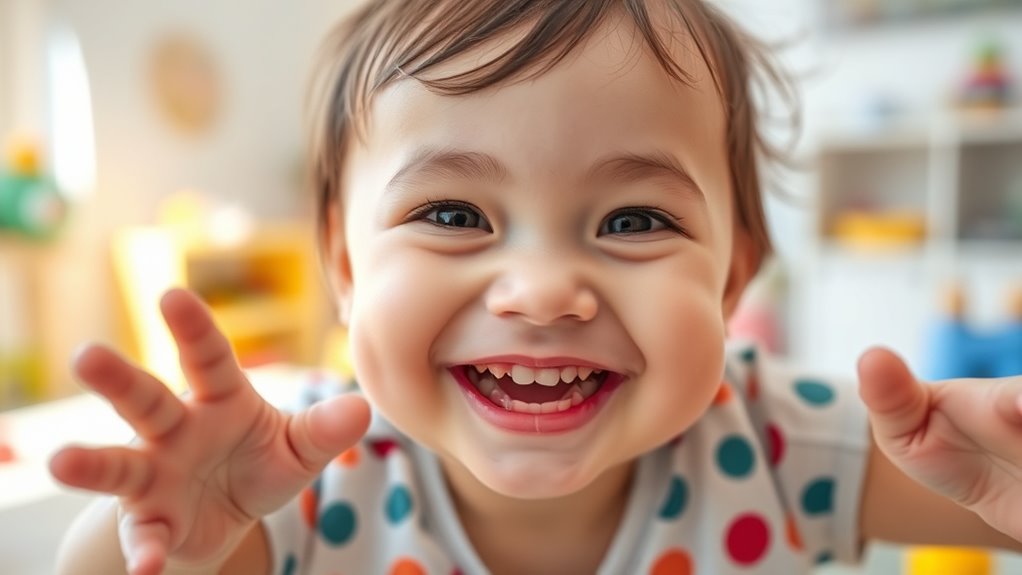
As your baby’s curiosity about their environment grows through problem-solving and exploration, their social and emotional expressions also become more noticeable. You’ll see them engaging in playful interactions, like smiling or giggling during fun activities, which shows their developing emotional recognition. They might imitate your facial expressions or respond with excitement when they see someone they know. Your baby begins to understand emotions behind actions, making interactions more meaningful. They may also display a growing range of feelings, from happiness to frustration, helping you recognize their emotional needs. These expressions strengthen their bond with you and others, laying the foundation for healthy social skills. Keep encouraging playful exchanges; they’re essential for your baby’s emotional development at this stage.

Frida Baby Silicone Teething Toys, 4-in-1 Teether for Babies & Infants, Teething Relief for 0-18 Months, Not-Too-Cold-to-Hold Baby Teether, BPA-Free
SILICONE BABY TEETHING TOY: Thoughtfully designed with a room-temperature silicone handle that prevents baby's hands from getting cold…
As an affiliate, we earn on qualifying purchases.
As an affiliate, we earn on qualifying purchases.
Communication and Language Skills
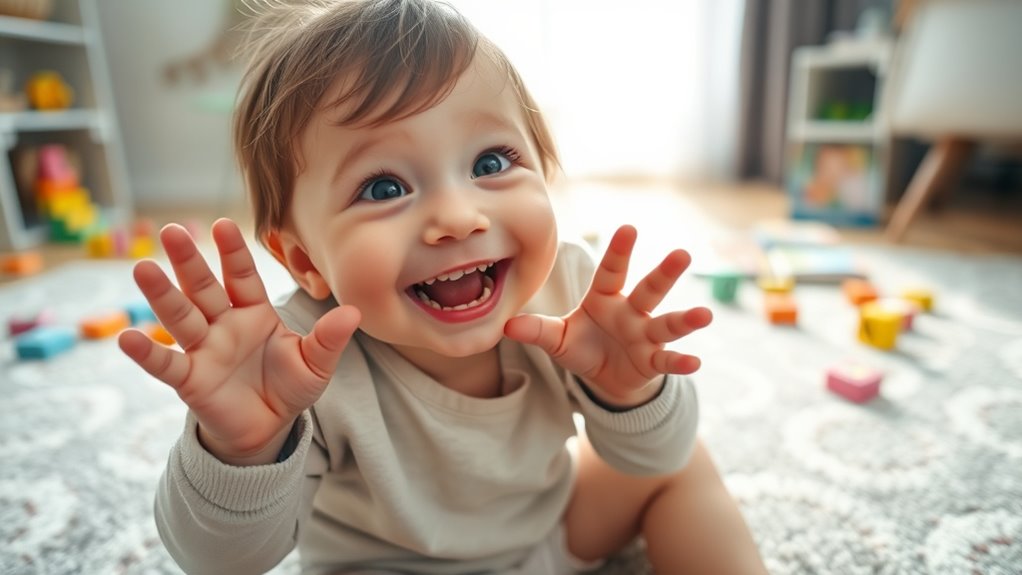
Wondering how your baby is beginning to communicate? Around this age, you’ll notice your little one engaging in baby babbling, making sounds like “ba,” “da,” or “ga.” This is a key sign of developing language skills. Your baby is also improving their language comprehension, understanding simple words or gestures like “no” or waving goodbye. They may respond to their name or recognize familiar voices. As they experiment with sounds, they’re laying the foundation for speech development. Encourage this progress by talking to them often, naming objects, and responding to their sounds. Remember, every baby progresses at their own pace, but early signs like babbling and understanding are promising milestones in their communication journey. Furthermore, their ability to understand simple words and gestures indicates early receptive language skills that support overall communication growth, which is an essential part of fostering digital literacy in modern early childhood development. Developing receptive language skills is crucial as it helps children understand and process information, facilitating their overall learning and interaction.
Frequently Asked Questions
How Can I Support My Child’s Emotional Regulation Development?
You can support your child’s emotional regulation by teaching emotional literacy, helping them identify and express their feelings. Use calming techniques like deep breathing or gentle hugs during upsetting moments to help them learn self-soothing. Encourage open conversations about emotions, validating their feelings, and modeling calm behavior yourself. These strategies build their ability to manage emotions effectively, fostering resilience and a strong foundation for emotional health.
What Are Early Signs of Speech Delays?
If you notice your child isn’t babbling by 12 months or isn’t using gestures like pointing, it could be early signs of speech delays. You might also observe limited response to their name or difficulty understanding simple instructions. Consider consulting a speech therapist early on, as they can assess for language delays and recommend interventions. Early support helps your child develop stronger communication skills and boosts their confidence.
How Does Sleep Affect Developmental Milestones?
Think of sleep as the foundation of a house; if it’s weak, everything else suffers. Sleep affects developmental milestones by supporting brain growth and memory. When your child has consistent sleep patterns and nap routines, they’re more alert and enthusiastic to learn new skills. Poor sleep can slow progress in language, motor, and social skills. So, prioritize a regular sleep schedule to help your little one reach their full potential.
When Should I Be Concerned About a Child’s Social Interactions?
You should be concerned about a child’s social interactions if they struggle with social boundaries or peer interactions beyond typical developmental stages. Watch for signs like difficulty sharing, avoiding eye contact, or not responding to peers. If these behaviors persist past age 3 or worsen, it’s a good idea to consult a specialist. Early intervention can help improve social skills and ensure healthy peer relationships as your child grows.
What Activities Promote Cognitive Problem-Solving Skills?
You can promote cognitive problem-solving skills by engaging your child in activities like brain teasers and puzzle games. These activities challenge their thinking, encourage critical analysis, and improve their reasoning abilities. You should choose age-appropriate puzzles that match their developmental level, and work together to solve them. Regularly introducing these stimulating activities helps strengthen their problem-solving skills and builds confidence in tackling new challenges.
Conclusion
By 4 to 6 months, you’re witnessing your little one transform into a tiny superhero, conquering motor skills, revealing problem-solving powers, and unleashing a flood of adorable smiles and sounds. Every giggle, grasp, and gaze is a giant leap in their incredible development adventure. Cherish these moments—they’re building the foundation for a future full of curiosity, confidence, and endless possibilities. Your baby’s growth is nothing short of astonishing, and you’re right there, guiding every magical step!
